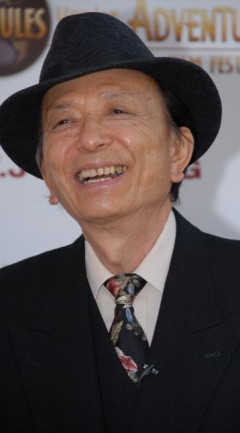Spotlight
James Hong, Veteran Actor Receives His Star on Hollywood's Walk Of Fame! 2022 is a Year of Great Firsts for Asian Americans in Hollywood
Iris Chang Historian, Author World Change Agent 1968-2004
On November 11, 2004, Iris Chang, one of Americas leading young historians died at age 36.
On November 11, 2004 one of Americas leading young historians died at age 36. Iris Chang, a second generation Chinese American, was born in Princeton, New Jersey and grew up in Champaign-Urbana, Illinois.
Iris performed a history changing service when she wrote her book, "The Rape of Nanking". Her book was the first full-length English account of this atrocity it remained on the New York Times bestseller list for several months. Iris highlighted a little known piece of history to reveal the unspeakable horrors of war. She showed how war and the war/mob psychology dehumanizes people and allows them to act in barbaric ways towards other human beings.
Iris Chang was driven to share her passion for human rights, World War II history, Cold War history, the Asian American experience, Sino-American relations, and the future of American civil liberties. She dug deeply into her research and was profoundly impacted by the horrors that she found.
Her physical and emotional health suffered greatly, she even lost most of her hair from the stress during her research for her book, "The Rape of Nanking". But she was determined to communicate the history so that others can learn from them. Iris's grandparents' harrowing escape from Nanking were part of her family legacy and prompted her to embark on this ambitious project. She interviewed elderly survivors of the massacre and discovered thousands of rare documents in four different languages.
After two years of hearing stories and looking at numerous pictures of bayoneted babies, headless bodies and disemboweled women she discovered her hair falling out. "I couldn't sleep. I couldn't eat. Even my editor lost 10 pounds just from the stress of dealing with all this, even secondhand," she says.
So horrific was the bloodbath that one sickened Nazi diplomat pleaded directly -- and vainly -- to Adolf Hitler for intercession. "You think you know what evil is," Chang said, "how bad things can be. But nothing prepared me for what I found. Even stories and films of the Holocaust."
Unlike the Holocaust, the Rape of Nanking is barely mentioned in most histories of World War II and is absent from almost every textbook. Few non-Chinese other than scholars and specialists remember that 67 years ago this month -- four years before Pearl Harbor -- the Japanese Imperial Army ran riot in the then-capital of China, now known as Nanjing, hacking apart in eight weeks between 260,000 and 350,000 people -- far more than died in Hiroshima and Nagasaki combined. Chang finds the global amnesia obscene.
An estimated 80,000 Chinese were raped during those eight weeks, including young children, most of whom were then grotesquely mutilated or killed. Unlike the Nazis, who tried to hide or at least obscure the scope of their atrocities on civilians, the Japanese flaunted theirs in full view of horrified foreigners with cameras, most of whom tried futilely to stem the slaughter, even as they recorded it on film. (1)
The Rape of Nanking was Iris Changs second book, her first book, "Thread of the Silkworm," tells the ironic story of Dr. Tsien Hsue-shen. Born in China and educated at M.I.T. and Cal Tech, Tsien became a professor at both universities and a brilliant space age pioneer. After 15 years of major contributions to American military defense, he was branded a Communist during the McCarthy era and deported to China --where he revolutionized the Chinese missile program and developed the Silkworm missile that later threatened American armed forces.
In 2003 Iris released her last book, The Chinese in America: A Narrative History, an epic story that spans 150 years to the present. She shows what it means to be an Asian American and draws a complex portrait of the many accomplishments, discrimination and suffering of the Chinese in their adopted country, from building the transcontinental railroad to major scientific and technological advances.
Iris Chang suffered a breakdown and was hospitalized during a recent trip researching her fourth book about U.S. soldiers who fought the Japanese in the Philippines during World War II, according to her former editor and agent Susan Rabiner.
On November 11, 2004, 67 years later on the anniversary of the Japanese war claimed another precious life, the life of Iris Chang. I am speculating here, but from reading about how she was so traumatized and nauseated by her research into the wide scale brutalization of hundreds of thousands of innocent people, I imagine that the inerasable war stories in her memory may have driven her to find a permanent escape from them.
In a note to her family, she asked to be remembered as the person she was before she became ill engaged with life, committed to her causes, her writing and her family,'' Rabiner said.
Robert Muller, the former assistant Secretary General of the United Nations stated : "War is the most extreme, most despicable form of violence, for it clothes itself with glory, heroism, medals, monuments, uniforms, memorials and the whole battery of pseudo-ethics invented by power drunk nations."
I mourn her death and the loss of further contributions she would have made. I give thanks for her and her gifts to all humankind. May we honor her memory by seeking other ways of resolving conflict than by force and physical might.
(1) Excerpts of information from Washington Post
December 11, 1997
Iris Chang lived in San Jose with her husband
and their two year old son.
Notes of condolence may be sent to:
The Chang Family
PO Box 641104
San Jose, CA 95164
The Iris Chang Scholarship Fund has been announced
for journalism students at the University of Illinois.
Contributions to the fund may be sent to:
The University of Illinois Foundation,
Re: Iris Chang Scholarship Fund.
University of Illinois Foundation
Attn: Jeff Roley
1305 West Green Street
Urbana, IL 61801-2962
AsianConnections columnist Marilyn Tam is an influential corporate leader, speaker, consultant, author, and social activist. www.HowToUseWhatYouveGot.com. In her book,How to Use What Youve Got to Get What You Want Ms. Tam talks about how to discover your own inner North Star, and how to use it to navigate your efforts to achieve maximum personal success.





